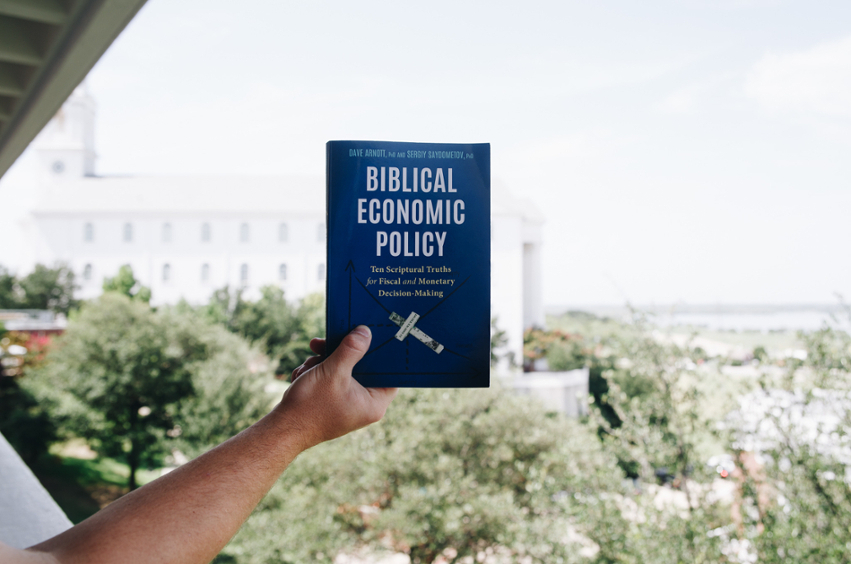Biblical Economic Policy: A Useful Guide to a Christian Perspective on Economics
This article is over six months old and may reference former titles for DBU faculty or staff, discontinued programs, or other details that have since changed. If you have any questions, please contact us at news@dbu.edu, or (214) 333-5172.

On July 19, the Institute for Global Engagement, in conjunction with the Institute for Christian Economics, held a book signing and short session for Dr. Dave Arnott and Dr. Sergiy Saydometov. Dr. Jeff Johnson, Dean of the College of Business, kicked it off by giving a short introduction to the two authors and recalling the many years of experience he has had with both DBU professors.
"It's important to have these discussions on Biblical economics and I couldn't be happier it's being led by these two leaders," Dr. Adam Wright followed. "These are two of my great friends, scholars, authors, and Christian men."
Arnott, full of energy and passion, discussed his inspiration for co-authoring the book as well as different elements of the book itself. Saydometov followed and discussed his upbringing in Ukraine and the freedom and opportunity he has experienced since being in the United States. Both Arnott and Saydometov humbly thanked the audience for coming and learning more about the book and stayed afterwards to sign copies of their books for guests that attended.
Book Review of Biblical Economic Policy: Ten Truths for Fiscal and Monetary Decision-Making
What does the Bible say about economics? This is the question Dr. Dave Arnott and Dr. Sergiy Saydometov set out to answer in their new book, Biblical Economic Policy: Ten Scriptural Truths for Fiscal and Monetary Decision-Making. As Dr. Arnott and Dr. Saydometov note, "The Bible has something to say about all these critical present-day issues," and their exploration into how the Bible and economics meet is thoroughly laid out in their work.
As is often stated by the authors, Biblical Economic Policy is built upon the foundation of a Biblical worldview. Throughout the book, everything is approached with a "neighbor before self" mindset and turns a secular approach on economics on its head. Arnott and Saydometov make clear that "Christian economics is about making Biblical choices among the many opportunities presented to us," (10) and remind Christians that we are stewards of God's creation and "we must see our work within the larger perspective of God's plan for the restoration of His creation," (31).
A moral standard is set by the authors in order to make the case that the fundamental truths of Christianity should drive every part of one's life, especially economics. To help form and practice these truths, Arnott and Saydometov created the "Ten Commandments of Biblical Economics." These ten commandments are:
- People should be free
- Work is good
- Don't steal
- Don't covet
- Use honest measures
- Trade is good
- Love your neighbor as yourself
- Take care of widows and orphans
- Be a good Samaritan
- Honor those in power
Not only are these principles a means to figuring out how the Bible informs economical thinking, but they are a useful guide to navigating the stormy waters of money and finances on a practical basis. While "the Bible does not prescribe a particular form of government or a particular economic system… the biblical perspective does contain principles conducive to political, economic, and religious/moral freedom," (42).
Arnott and Saydometov thus explain that a free market is the most accurate and caring system of economics that we can formulate, centered heavily on loving your neighbor as yourself. "That's the beauty of free markets: producers use their private property to provide services for their neighbors," (70). In summation of this idea, while no system is perfect, free markets most contribute to human flourishing.
"Does a first-century book tell Christians how to respond to twenty-first-century macroeconomic policies? We believe it does," (271). As they connect Biblical truths with economic systems, both Arnott and Saydometov bring their knowledge, passion, and energy to promote forward a Biblical way of economic living. This book is a gripping read that engages the core being of the reader and challenges them with one main question, "is this the way we're supposed to run a biblical economy?" By captivating their audience and using real examples of good and bad economical practices, Arnott and Saydometov deliver a profound reminder that for Christians, stewardship is not about self-improvement but about making choices that please and honor God.
Dr. Arnott is the Professor of Management and has a B.A. from Greenville College, M.B.A from Texas A&M University Commerce, and a Ph.D. from the University of Texas at Arlington. Dr. Sergiy Saydometov is the Associate Dean of the College of Business, Assistant Professor of Finance, and has a B.B.S from Dallas Baptist University and both a M.B.A and Ph.D. from the University of Texas at Arlington. You can purchase Biblical Economic Policy: Ten Scriptural Truths for Fiscal and Monetary Decision-Making online wherever books are sold.
Brooks Anthony writes for the University Communications Department for Dallas Baptist University.








